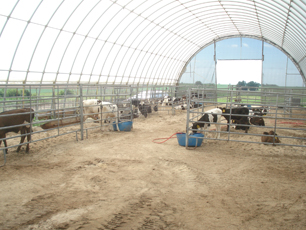G2157
Good Management Practices for Youth
Shelter and Housing
As a good and responsible livestock producer, you are providing excellent care for your animals on a full-time basis. Below are sound production practices to help your animal thrive in your care. In addition, a checklist has been provided to make sure you follow these guidelines prior to and while at fairs and other public exhibitions.
This is No. 2 in a series of seven documents on good management practices for youth. Copies of these documents, commonly asked questions, feed and water requirements, and many other animal care and well-being documents can be accessed at http://4h.unl.edu/resourceanimalcare.
Lindsay M. Chichester, Extension Educator
Dennis E. Bauer, Extension Educator
|
Prior to Fair
Shelter and housing allow your animal to get out of extreme weather conditions, such as very cold or hot temperatures, wind, hail, etc. If your animal is exposed to extreme cold or hot temperatures, it not only can become stressed but also may decline in health and performance. This happens because your animal is trying to regulate its body temperature to be comfortable.
The shelter you provide for your animal should be cleaned on a regular basis to ensure optimal health. If you are providing bedding for your animal, make sure it is clean and changed on a regular basis.
Biting insects, such as flies, can be a nuisance to your animal and cause stress. A clean pen or space is essential for fly control. Fly spray also can be applied to your animal or the area around your animal. Make sure you read label directions and follow withdrawal dates, if applicable.
Be sure you know which type of bedding (e.g., straw, shavings, wood chips, sand, etc.) can be used at the fairs you will be attending. Some fairs only allow certain types of bedding. If you have been providing a certain type of bedding at home and need to switch to a different type at fair, it is best to start making the transition to the new bedding at home so your animal is familiar with it prior to the fair. You will be at ease knowing that your animal is comfortable.
As a good youth producer, I know that prior to fair my animal has received:
- protection from extreme weather conditions,
- clean and fresh bedding as needed and removal of dirty and soiled bedding, and
- training if the bedding differs from what is used at home.
While at Fair
While at fair you should continue to ensure your animal’s bedding is clean and fresh and that your animal is comfortable in its surroundings.
As a good youth producer, I know that at fair my animal has received:
- protection from extreme weather conditions, and
- clean and fresh bedding as needed, and removal of dirty and soiled bedding.
By following these guidelines prior to and during fairs and exhibitions, you can minimize stress for both you and your animal. In return, your animal not only will perform better but also will behave better. You will have the satisfaction of knowing that you have provided the best possible care for your animal.
Annually, Nebraska’s youth are required to complete Quality Assurance (QA) training. Quality Assurance is a program that educates youth about the best management practices for livestock production. In addition, it was developed to assure consumers that the food products produced from animals are wholesome and safe, and that the animals that produced the product were cared for properly. In 2012, this training also was made available online for 4-H and FFA members at three different age levels: Junior (8-10); Intermediate (11-14); and Senior (15-18). More information about the Nebraska Youth QA Program can be found at http://4h.unl.edu/qualityassurance.
This publication has been peer reviewed.
Visit the University of Nebraska–Lincoln Extension Publications website for more publications.
Index: Animals, General
Management
Issued June 2012
